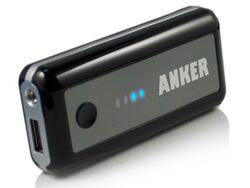Company:Anker (electronics)
 | |
| Type | Subsidiary |
|---|---|
| Industry | Electronics |
| Founded | July 2011 |
| Founder | Steven Yang |
| Headquarters | Shenzhen, Guangdong, China |
Area served |
|
| Products |
|
| Parent | Anker Innovations |
| Website | anker |
Anker is a brand of Chinese electronics company Anker Innovations (formerly Oceanwing).[1] based in Shenzhen, Guangdong. The brand is known for producing computer and mobile peripherals, especially power banks.
History

Steven Yang started Anker in 2011 after working as software engineer for Google in California . He moved to Shenzhen, China. In early 2012 Google's then-head of sales in China, Dongping Zhao, was hired and as of 2018 is president of Anker Innovations.[2]
In 2012, Anker switched its focus from replacement laptop batteries to smartphone battery chargers and wall chargers.[2]
Anker maintains subsidiaries in California , Germany , the United Kingdom , Japan and China as well as contractors in South Korea , Kuwait, Saudi Arabia and Romania. Before 2017 Anker devices were almost exclusively sold at Amazon Marketplace.
Products
Anker charging devices use its PowerIQ proprietary technology, which detects the connected device and automatically optimizes the current delivered, thereby reducing the amount of time for a device to reach full charge.[2] Many of Anker's charging devices also use various fast-charging technologies, such as Quick Charge. Anker was mentioned in 2015 as the leading brand of mobile chargers on Amazon.com.[3]
Outside of its core competency, Anker also incorporates other product lines:
- Eufy (smart home appliances, since September 2016)[4], including the robotic vacuum cleaner Eufy RoboVac 11. [5]
- Soundcore (headphones and portable speakers)
- Zolo (headphones and portable speakers, since 2018)
- Nebula (portable video projectors)
- Roav (car accessories)
Controversies
In 2014, an Indiegogo campaign to promote a set of magnetic accessories called Zolo was launched.[6] Due to prolonged manufacturing challenges the project was set on hold and 1863 backers were offered a 200% refund.
In 2016, a batch of Anker USB-C charging cables suffered a manufacturing defect that could potentially cause damage to connected hardware, leading to a recall.[7]
See also
- Ecovacs Robotics
- iRobot
References
- ↑ Chokkattu, Julian (2018-01-08). "Anker Innovations’ six key sub-brands focus on smart home, batteries, and more". https://www.digitaltrends.com/mobile/anker-innovations-eufy-roav-zolo-anker-nebula/.
- ↑ 2.0 2.1 2.2 Staff, Nick (2017-05-22). "How Anker is beating Apple and Samsung at their own accessory game". https://www.theverge.com/2017/5/22/15673712/anker-battery-charger-amazon-empire-steven-yang-interview.
- ↑ "How a Chinese startup became a top seller on Amazon.com". internetretailer.com. https://www.digitalcommerce360.com/2015/10/03/how-chinese-startup-became-top-seller-amazoncom/. Retrieved 2017-05-28.
- ↑ Kamps, Haje Jan. "Anker launches sister brand for home automation". https://techcrunch.com/2016/09/14/eufy/.
- ↑ Best Robotic Vacuums From Consumer Reports' Tests
- ↑ "Zolo: A Magnetic Case, Battery & Cable System | Indiegogo". indiegogo.com. https://www.indiegogo.com/projects/zolo-a-magnetic-case-battery-cable-system--2#/. Retrieved 2016-11-06.
- ↑ "Ankers away! USB-C cables recalled over freakin' fried phone fears". TheRegister.com. https://www.theregister.co.uk/2016/08/30/anker_usbc_cables_recalled#/. Retrieved 2017-02-01.
External links
